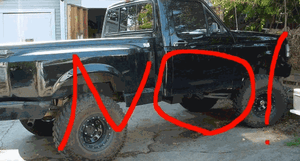 This is a recurring segment, with a recently-updated title, "Simple Answers," where I gather the questions I come across on the Internet in a given week, and provide a straightforward answer.
This is a recurring segment, with a recently-updated title, "Simple Answers," where I gather the questions I come across on the Internet in a given week, and provide a straightforward answer.
This week's question again concerns clickbait.
Clickbait: your secret six-times per-day interaction with Russia you probably weren't looking forward to.
Here's your chance to have a simple question answered.
Clickbait is all about working the system, firing people up, and making money doing so
The internet is free to exist. Al Gore once said he invented it. Some old government schlub nobody remembers once called it “a series of tubes. ” The kids loved that one.(A momentary bit of research tells me this was coined by Alaskan Senator, Ted Stevens, and his exact words were, "The internet is not a big truck. It's a series of tubes.")This fact will play a part in a moment.
Case in point: people love slicing through the internet because it carries boatloads of accessible knowledge at bargain prices. The tricky bit is that the stuff on the internet does not exist FOR FREE. All the websites, and weather reports, and Netflix, and advertisements advising you add solar panels to your roof and fix your low-hanging balls all have to live somewhere.
Living somewhere, living ANYWHERE, costs the owner money to the hosting server. This means there's an operational cost.
What does this have to do with clickbait headlines?
Like most things, it has to do with the valuable of virtual real estate.
Countless bits of stuff live out in the internet’s weird amaterial darkness. The search engines like Google catalog the weird darkness so a consumer can find the information they're looking for. The reason once again why this has anything to do with clickbait comes down to how the search engines catalog the bits of stuff.
A contained website’s visibility is governed by their authority ranking with a search engine. Authority comes from traffic. The more people they can get to click on their site after searching for certain things with the search engine, the greater accuracy the search engine achieves.
The search engine wants the user to get what they need quickly. That makes their product a good service. Websites are writing clickbait are counting on that fact. So they work the ranking system.
This is when clickbait appears. Once again, a website wants people to visit their site. That's all. They want eyeballs on their site so they can charge more money for their ad space.
They have rent to pay to server hosts and they have employees on payroll.
So they write clickbait articles to work the search engine and entice visitors into thinking want they have is the solution.
These are the articles titled with:
- “You won't believe…”
- “One weird trick…”
- “How badly did the new…”
My favorite is “Ways BLANK sucks!”
It's more toxic on YouTube by orders of magnitude.
Why can't Google block clickbait?
Search engines aren't powerful enough yet to read all the way into a website’s code. They can read a lot. They can see header text, metadata, URLs, and generally recurring keywords and phrases.
The search engines cannot point to something and know it's clickbait. The websites writing the clickbait know this. They maximize these search points, as well as write incendiary headlines to gain further traction on social sharing platforms.
If the internet is a replacement for an encyclopedia, or a library, or just wisdom on-demand, the motivation still needs to be sharing knowledge. With clickbait headlines, that is becoming an impossibility.

